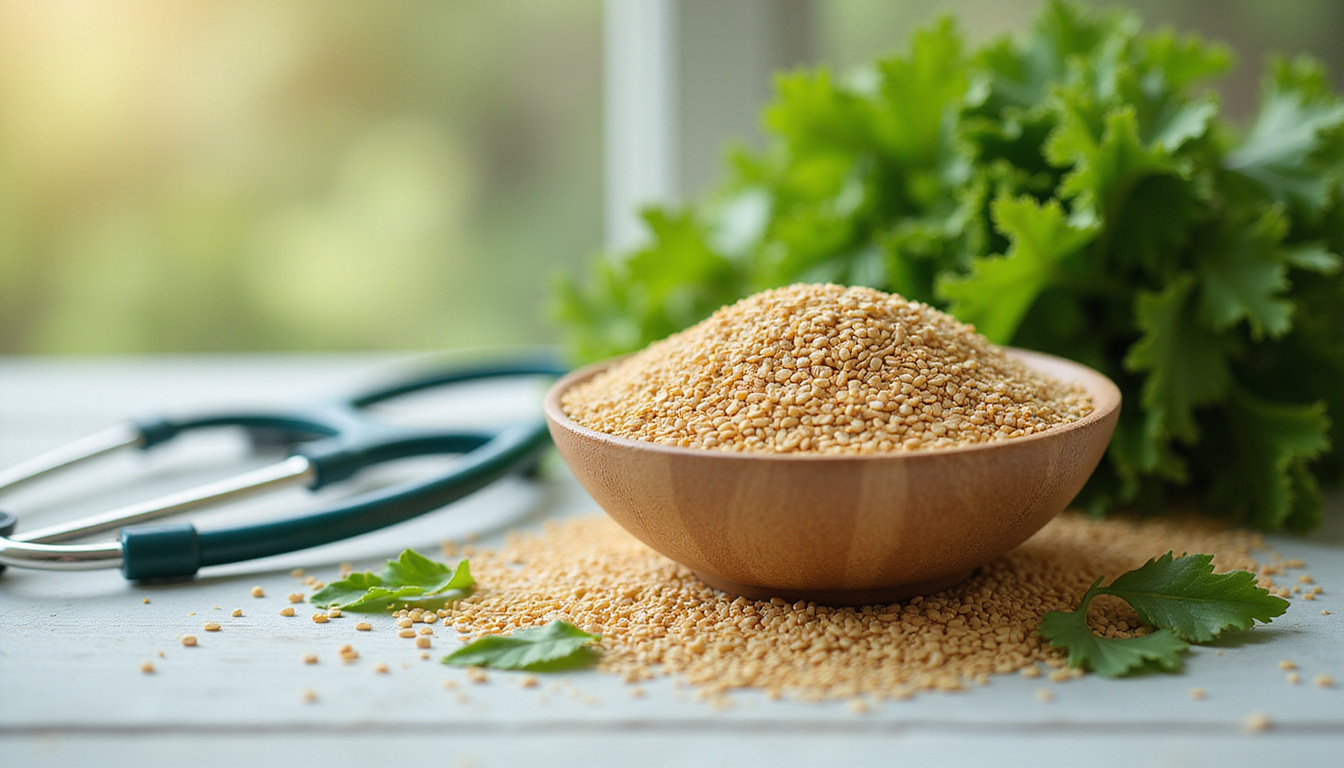
Unlocking the Power of Flaxseed: A Natural Remedy for High Blood Pressure Benefits
Share
High blood pressure, often referred to as hypertension, is a silent yet significant health issue affecting millions worldwide. With its roots deeply entrenched in stress, poor diet, and sedentary lifestyles, the quest for effective, natural remedies has never been more pertinent. Enter flaxseed, a humble superfood that’s been hailed for its remarkable health benefits. Recent research has shown that flaxseed is found to benefit high blood pressure, offering a holistic approach to managing this prevalent condition. This article will delve into understanding high blood pressure, explore the incredible nutritional profile of flaxseed, and reveal the mechanisms through which flaxseed helps lower blood pressure, empowering you to make informed decisions in your health journey.

Key Takeaways
- High blood pressure poses significant health risks that can be mitigated with natural remedies.
- Flaxseed is rich in omega-3 fatty acids, fiber, and beneficial compounds that support heart health.
- Studies have shown that flaxseed can effectively lower blood pressure levels.
- Incorporating flaxseed into your diet can be a simple yet powerful strategy for hypertension management.
- Understanding the nutritional benefits of flaxseed empowers individuals to make healthier lifestyle choices.
Understanding High Blood Pressure and Its Risks
High blood pressure, also known as hypertension, is a silent yet dangerous condition affecting millions worldwide. Characterized by elevated pressure in the arteries, it puts undue stress on the heart and can lead to serious health problems such as heart disease, stroke, and kidney damage. Understanding the risks associated with high blood pressure is essential for making informed health decisions.
One powerful ally in managing hypertension is flaxseed, which has been found to benefit high blood pressure significantly. Rich in omega-3 fatty acids, fiber, and antioxidants, flaxseed promotes cardiovascular health by improving arterial function and reducing inflammation. Incorporating flaxseed into your diet, whether in powder form, oil, or as whole seeds, aligns with a holistic approach to wellness and reflects a commitment to natural, plant-based medicine. By prioritizing dietary choices that support bodily stewardship, we can take actionable steps towards better health, avoiding the pitfalls of mainstream medical prescriptions and embracing a lifestyle grounded in faith and personal freedom.
The Nutritional Profile of Flaxseed
Flaxseed, often hailed as a superfood, is rich in essential nutrients that can significantly contribute to a healthy lifestyle. This tiny seed packs a powerful punch, especially for those looking to manage high blood pressure naturally.
Nutrients in Flaxseed
- Omega-3 Fatty Acids: Particularly alpha-linolenic acid (ALA), known for its anti-inflammatory properties.
- Fiber: Rich in both soluble and insoluble fiber, which aids in digestion and blood sugar regulation.
- Lignans: Phytoestrogens with antioxidant effects, beneficial for heart health.
- Vitamins and Minerals: B vitamins, magnesium, and manganese—vital for many bodily functions.
Flaxseed and High Blood Pressure
Research has highlighted that flaxseed benefits high blood pressure. Regular consumption may improve endothelial function and reduce arterial stiffness. The rich omega-3 content and fiber in flaxseed help promote heart health by lowering LDL cholesterol and supporting cardiovascular function.
How to Incorporate Flaxseed into Your Diet
- Smoothies: Add a tablespoon of ground flaxseed to your morning smoothie.
- Baking: Mix flaxseed into muffins, bread, or pancake recipes.
- Salads: Sprinkle whole or ground flaxseed for added texture and nutrition.
Conclusion
Incorporating flaxseed into your daily routine not only aligns with natural health practices but also supports your journey towards personal freedom in health choices. As stewards of our bodies, embracing plant-based solutions like flaxseed reflects a holistic, faith-grounded approach to wellness. Discover more about natural remedies and nutritional insights at JustVitamins.org.
"Let food be thy medicine and medicine be thy food." – Hippocrates

How Flaxseed Helps Lower Blood Pressure
Flaxseed, an ancient remedy that our ancestors revered, has gained attention in modern wellness circles for its remarkable ability to support heart health. Research indicates that flaxseed has beneficial properties for those dealing with high blood pressure. Rich in omega-3 fatty acids, lignans, and fiber, flaxseed is a powerhouse in natural medicine and aligns seamlessly with a holistic approach to health.
Omega-3 Fatty Acids
These reduce inflammation and promote healthy circulation. They help relax blood vessels, lowering blood pressure. When included in a balanced diet, flaxseed supports cardiovascular function and reduces hypertension risk.
Lignans for Heart Health
Flaxseed is one of the richest sources of lignans, which are antioxidants that can reduce blood pressure and cholesterol while promoting vascular elasticity—key in managing hypertension.
Dietary Fiber
High fiber content helps with digestion, weight management, and blood sugar regulation—all crucial for heart health and blood pressure control.
Recommended Use
Try 1–2 tablespoons of ground flaxseed daily, added to smoothies, oatmeal, or baked goods. Consult with a natural health practitioner for personalized advice.
A Biblical Perspective
Flaxseed use aligns with the biblical principle of stewardship over our bodies (1 Corinthians 6:19–20). Choosing natural means of care honors the Creator and reflects a commitment to holistic wellness and health freedom.
In conclusion, adding flaxseed to your diet can be a gentle but powerful step toward natural blood pressure management. As we explore nature’s pharmacy, we embrace choices that support long-term well-being—spiritually and physically. For more insights, visit JustVitamins.org.
Frequently Asked Questions
What is high blood pressure, and why is it a concern?
High blood pressure is a condition where the force of blood against artery walls is too high, increasing the risk of heart disease, stroke, and kidney damage.
What are the nutritional benefits of flaxseed?
Flaxseed contains omega-3s, fiber, lignans, and key minerals that support heart and overall health.
How does flaxseed specifically help in lowering blood pressure?
It improves blood vessel function, reduces inflammation, and enhances circulation, all of which help lower blood pressure.
What is the recommended way to incorporate flaxseed into my diet?
Use ground flaxseed daily in smoothies, oatmeal, or baked goods. Aim for 1–2 tablespoons per day for best results.
Are there any side effects of consuming flaxseed?
It's generally safe in moderation. Excessive amounts may cause digestive discomfort. Consult your healthcare provider if you’re on blood pressure medications.
